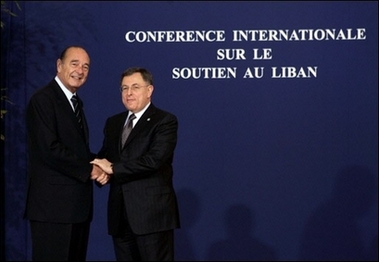 Saudi Arabia, the United States, France, EU and other international donors pledged more than 7.6 billion dollars in aid to Lebanon to support the government. The pledges were made Thursday during a one-day international donors’ conference held in Paris. In his opening speech, Lebanese Prime Minister Fouad Siniora thanked the participants from some 40 countries for their support, and appealed to foreign donors for further financial support, which he said was vital for Lebanon
Saudi Arabia, the United States, France, EU and other international donors pledged more than 7.6 billion dollars in aid to Lebanon to support the government. The pledges were made Thursday during a one-day international donors’ conference held in Paris. In his opening speech, Lebanese Prime Minister Fouad Siniora thanked the participants from some 40 countries for their support, and appealed to foreign donors for further financial support, which he said was vital for Lebanon
The war-torn country is also heavily indebted from the effects of 15 years of civil war in the 1970s and 80s.
The Lebanese government hopes to raise at least $9 billion for reconstruction and repaying debts.
Donations and soft loans are needed to generate confidence, stimulate investment and repay public debt that saddled Lebanon with a staggering $40bn burden, correspondents say.
Reports say Saudi Arabia pledged an additional $1.1 billion in aid ($1bn in development funding and an extra $100m gift to the government), while France announced a $648 million and the European Union pledged another $518 million in new aid and loans.
Multilateral donors also made large pledges, with the World Bank offering $1 billion in aid, the European Investment Bank $1.2 billion dollars, the Islamic Development Fund $250 million and the Arab Fund for Economic and Social Development offering $700 million.
Britain offered $48 million to a UN agency to assist Palestinian refugees, many of whom are in Lebanon.
- U.S. triples aid

Meanwhile, the U.S. Secretary of State Condolzza Rice pledged a new $770m aid package to Lebanon, which must first be approved by the U.S. Congress.
She said the pledge would bring the level of U.S. aid to Lebanon since last summer to more than $1bn, adding that the money would be used to fund long-term redevelopment and immediate rebuilding from the devastating 34-day conflict between Israel and Hezbullah ast summer.
"This is a package that is for Lebanon," Rocesaid when asked if the money is contingent on the survival of a U.S.-backed government in Beirut. "Lebanon is a democracy."
Siniora, seated beside Rice at a press conference, said the money pledged at today’s conference is "not for the benefit of one group or one person."
The Lebanese premier is facing growing calls to quit from the Hezbullah-led opposition, which led huge street protests on Tuesday in a campaign to bring down the fragile Lebanese government.
Washington classifies Hezbullah as a terrorist organization that cannot be granted U.S. funding. The same U.S. laws led to a suspension of direct U.S. aid to the Palestinian government after Hamas won the parliamentary elections last year.
The Bush administration has since found ways to segregate money for the Western-backed Palestinian President, Mahmoud Abbas, but it is not clear what the administration would do if Siniora’s government falls in Lebanon.
American officials said the U.S. contribution would include $220 million in military aid for Saniora’s government. The money could buy small arms, ammunition, spare parts and Humvees, they noted.
The U.S. money would more than triple last year’s pledge of $230 million, and represents a major increase over past years’ annual offerings of approximately $40 million.
It isn’t clear whether any of the U.S. money would directly fund efforts to disarm Hezbollah, a condition Washington insisted must be part of any settlement to end the conflict with Israel but which has never been implemented.
–AJP and agencies



